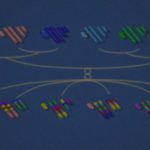Link to Pubmed [PMID] – 32124004
Link to DOI – 10.1007/s00335-020-09830-8
Mamm. Genome 2020 04; 31(3-4): 69-76
Scientists from 12 countries met at the International Mammalian Genome Conference (IMGC) to share advances in mammalian genetics and genomics research. The event was held in Strasbourg, France and represents the city’s second time hosting the IMGC. A diverse attendance of pre-doctoral and post-doctoral trainees, young investigators, established researchers, clinicians, bioinformaticians, and computational biologists enjoyed a rich scientific program of 63 oral presentations, 65 posters, and 5 workshops in the fields of epigenetics, system genetics, developmental biology, cancer, human disease modeling, technical advances, and bioinformatics. This report presents selected highlights of this meeting which illustrate how recent advances in mammalian genetic approaches have improved our ability to decipher complex biological mechanisms.

